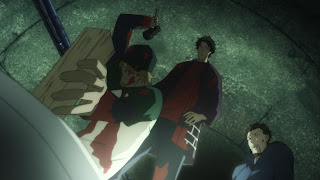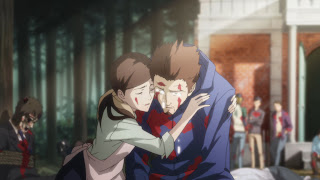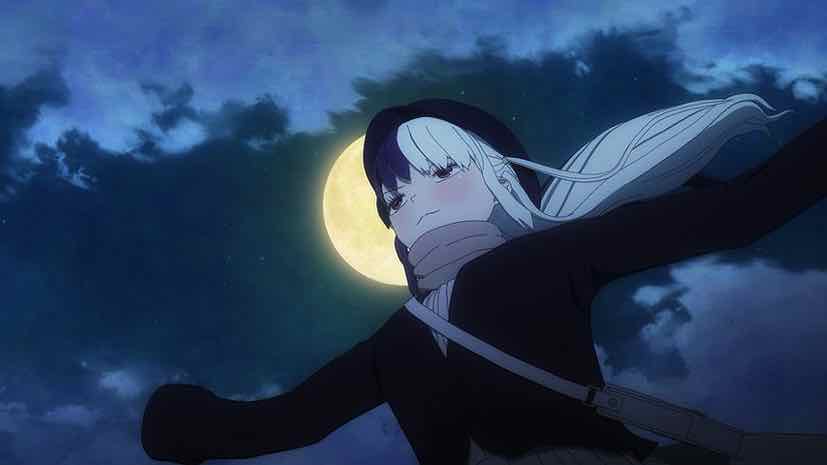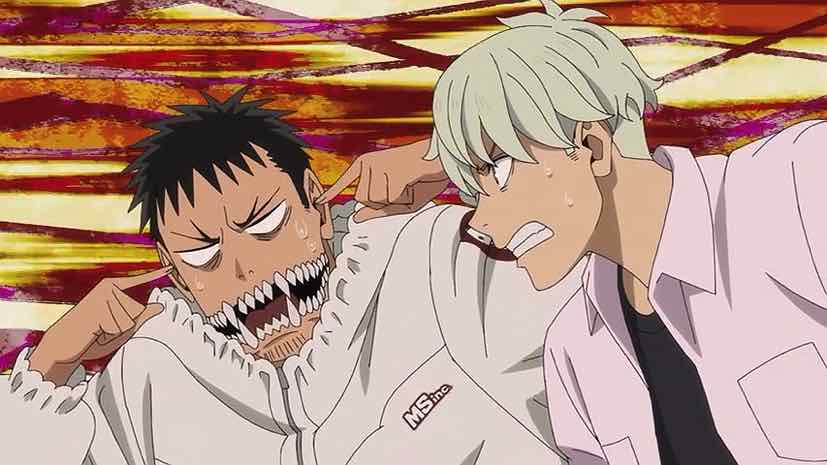It droppeth as the gentle rain from heaven
Upon the place beneath. It is twice blest:
It blesseth him that gives and him that takes.
Tis mightiest in the mightiest; it becomes
The throned monarch better than his crown.
His scepter shows the force of temporal power,
The attribute to awe and majesty,
Wherein doth sit the dread and fear of kings.
But mercy is above this sceptered sway;
It is enthroned in the hearts of kings;
It is an attribute of God himself;
And earthly power doth then show like God’s
When mercy seasons justice.
– William Shakespeare, 1600
It’s always funny to revisit a series whose twists and turns you agonized over after a long time away – in this case nearly six months – in the form of DVD extra episodes. There’s always a moment of disorientation at the beginning, as the oddness of seeing these characters again strikes a discordant note. Then, eventually, the mind begins to remember what it was about the show that so entranced in the first place. If the episodes are good, this process can happen remarkably quickly. With this episode of Shiki, I was completely “in the moment” before 5 minutes has passed – and this despite none of the major characters in the series making an appearance.
 Fuyumi Ono (Ghost Hound, The Twelve Kingdoms) is the original creator of the novels this series is based on, and while “Kingdoms” is her best known work, I think this is her masterpiece. The juggling of so many characters was a miraculous act over the course of the story, but what should have been confusing was clear, and what should have made it harder to identify with the central cast did not. It electrified and split the audience, prompting fascinating discussion and serious debate over the nature of the human vs. shiki war. And it was unrelenting in its depiction of the dark side of the human animal.
Fuyumi Ono (Ghost Hound, The Twelve Kingdoms) is the original creator of the novels this series is based on, and while “Kingdoms” is her best known work, I think this is her masterpiece. The juggling of so many characters was a miraculous act over the course of the story, but what should have been confusing was clear, and what should have made it harder to identify with the central cast did not. It electrified and split the audience, prompting fascinating discussion and serious debate over the nature of the human vs. shiki war. And it was unrelenting in its depiction of the dark side of the human animal.
I was not one of those who felt a great deal of sympathy for the Shiki at the time of airing. They started a war the humans didn’t ask for – started it by murder, by forcing parents to kill children and children to kill parents. In short, the humans did what they had every right to do – defend their existence. That some among them became consumed with savagery is undeniable and regrettable – but beside the larger point. Still, it was hard not to feel for individual Shiki – especially as it became clear via the likes of Tohru and Ritsuko – whose quiet, dignified death may have been the most uplifting moment of an incredibly depressing series – that some of them retained their essential nature.
 This extra largely focuses on another conflicted Shiki, Nao. She was a fairly important player early in the series but never among the core at the center. She killed her parents, her husband, even her son – hoping they would rise as Shiki. But they never did, and as Nao found herself among the stragglers of the Shiki hiding in the sewers and trying to delay death, all the ghosts of her past returned to torment her. Much of the episode is taken up with the brutal, ruthless hunt – the human leaders a mix of those drunk with savage revenge-lust and those heartbroken by what’s occurring. The survivors are hunted down one by one, staked as they slept or dragged screaming from their tunnels to die with the coming of day. It certainly doesn’t paint the humans in a good light – especially those killing other humans because they’ve been bitten, though with their attackers dead they present no threat. Clearly, the power to kill has become as important as the reasons behind it.
This extra largely focuses on another conflicted Shiki, Nao. She was a fairly important player early in the series but never among the core at the center. She killed her parents, her husband, even her son – hoping they would rise as Shiki. But they never did, and as Nao found herself among the stragglers of the Shiki hiding in the sewers and trying to delay death, all the ghosts of her past returned to torment her. Much of the episode is taken up with the brutal, ruthless hunt – the human leaders a mix of those drunk with savage revenge-lust and those heartbroken by what’s occurring. The survivors are hunted down one by one, staked as they slept or dragged screaming from their tunnels to die with the coming of day. It certainly doesn’t paint the humans in a good light – especially those killing other humans because they’ve been bitten, though with their attackers dead they present no threat. Clearly, the power to kill has become as important as the reasons behind it.
As Nao’s time slowly runs out, the other focus of the episode is on Hasegawa, the coffee shop owner and an outsider to Sotoba who already knew tragedy – he and his wife having lost their son in an accident. As a healthy, able-bodied man he’s naturally dragged into the Shiki hunt – though his heart is never in it. As things descend into a chaos of pure animal carnage – the Shiki desperately attacking as they’re cornered like rats, the townsmen killing them so fast they run out of stakes – Hasegawa refuses to hammer the stake himself. He’s saved from a Shiki attack by a cross he picked up on a whim, and he and his wife end up standing by as the last of the Shiki are tied up to await an agonizing death as the sun rises. It’s a scene of devastating power and incredibly disturbing – and then, the mood completely changes as Hasegawa finally takes up a metal stake and dignifies the proceedings with a tiny, seemingly illogical act of mercy.
 Make no mistake, watching this episode is not what I would call fun – the best eps of Shiki never were. But if you want to understand the power that anime has to move and to disturb, you could hardly spend a better 22 minutes (or 22 episodes). This series is completely ruthless – no punches are pulled and there’s no justice or honor. Only small, quiet acts of grace that stand out all the more for their rarity.
Make no mistake, watching this episode is not what I would call fun – the best eps of Shiki never were. But if you want to understand the power that anime has to move and to disturb, you could hardly spend a better 22 minutes (or 22 episodes). This series is completely ruthless – no punches are pulled and there’s no justice or honor. Only small, quiet acts of grace that stand out all the more for their rarity.
The next and final episode appears to return to all the major players, and what happened between episodes 21 and 22 (the finale). The PV did not include footage of Akira and Kaori, so I fear we may never find out just how Akira was saved from that Shiki safehouse, which would be unfortunate. Maybe they simply left it out of the preview. In any case, we’ll have one last look at Seishin (booo!), Dr. Ozaki, The Pimp, Natsuno and Sunako in what I’m sure will be a powerhouse conclusion to the saga.
One last note – I’d almost forgotten how incredible the background music for this series is. I can rarely remember such fitting BGM – it truly captures and enhances the atmosphere of the moment every time.



